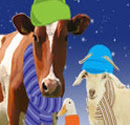
Camp Connell, Ca -- Part of every Sunday School curriculum teaches about the need to help the poor.
Traditionally, most people think of a tithe, or Biblical one-tenth, as a fair share standard, a standard which almost none of us live up to. (Some do, but not many.)
A tithe is also a culturally accepted standard, not just a preacher's tool to separate the money from parish members. Most of us think it is a good idea, but we simply can't afford it this year.
Many of us like the idea that those blessed with abundance (as in, the rich) are expected to give more.
One of the few good things I can note about the year 2006 is that a few very rich folks have done just that, and made the rest of us think about what we give, and why. For that we can thank the Gates and Buffett families.
And that giving might hold a clue to solving world poverty, if we will all cooperate.
Princeton bioethicist Peter Singer asked the following question today in a lengthy New York Times Magazine article about charity and its role in alleviating poverty:
"What is a human life worth? You may not want to put a price tag on a it. But if we really had to, most of us would agree that the value of a human life would be in the millions.
"Consistent with the foundations of our democracy and our frequently professed belief in the inherent dignity of human beings, we would also agree that all humans are created equal, at least to the extent of denying that differences of sex, ethnicity, nationality and place of residence change the value of a human life."
And...
"With Christmas approaching, and Americans writing checks to their favorite charities, it's a good time to ask how these two beliefs — that a human life, if it can be priced at all, is worth millions, and that the factors I have mentioned do not alter the value of a human life — square with our actions. Perhaps this year such questions lurk beneath the surface of more family discussions than usual, for it has been an extraordinary year for philanthropy, especially philanthropy to fight global poverty."
America's actions as a nation, and many Americans' individual actions, seem to show we actually do value the lives of some folks more than others. (I think immediately of our money spent on Iraq, and Darfur. Singer offers statistical proof.)
Singer goes on to detail the impact of the massive donations by Bill and Melinda Gates and Warren Buffett, and to talk about what their example might do.
Meanwhile, back to the "other" rich among us:
"...in the real world, it should be seen as a serious moral failure when those with ample income do not do their fair share toward relieving global poverty. It isn't so easy, however, to decide on the proper approach to take to those who limit their contribution to their fair share when they could easily do more and when, because others are not playing their part, a further donation would assist many in desperate need."
Singer applies philosophy and moral standards to the discussion, and comes up with some suggestions that might make a few rich folk squirm.
If you think it would not apply to you, make sure you check out his formulas for giving.
And then back up one blog in this series and read about the family in Transylvania that actually was living on $300 a year.
Maybe you and I are rich and just don't realize it.
Maybe we should each buy a cow, or goat, or pig, or tree for someone who needs it.
Read the excellent article by Singer online at the New York Times Magazine by cutting and pasting this link:
http://www.nytimes.com/2006/12/17/magazine/17charity.t.html?pagewanted=1&_r=1&ref=magazine
--